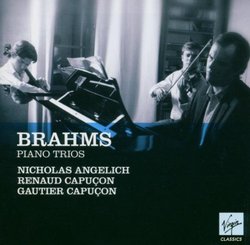Luminous Brahms
Alan Lekan | Boulder, CO | 01/03/2008
(5 out of 5 stars)
"I first heard of the Capucon brothers in a 2002 Lugano festival recording paired with Martha Argerich in the zippy Mendelssohn d-minor trio no. 1. Their gorgeous tonal control and razor-sharp ensemble in the rapid-fire scherzos were truly spellbinding. Note to self: keep an eye on these guys.
Now seeing their healthy discography in 2008 does not surprise me. These are very fine musicians - along with Mr. Angelich who is well-paired with them. It has been an absolute thrill to take in their performances here which present to us a very luminous, slower-to-unfold and deeply communicative Brahms. Each of the three trios is magnificant.
Their overall treatment is exceedingly radiant in tone with somewhat relaxed and notably slower tempos/times compared to other recordings. Compared to say, the Beaux Arts Trio's recordings, this reading here is quite longer in every movement. So often with deliberately slower tempos, a movement is at risk in languishing. Yet, to me, their slower pace really works when combined with their ability to draw out of the inherent romantic ardour within these pieces. It seems these musicians play more from a core of emotional connection felt within the music. I found the overall effect very moving.
Brahms' was twenty before he wrote his first true masterpiece - the Op 8 trio in B flat. This piece never quite caught my attention listening to the Beaux Arts recording on Philips Duo. Maybe it was the poorer sound quality of the former, but this piece's greatness finally became obvious to me in the Angelich/Capucon trio's hands. They take their time but it totally gives the music time to breathe and to speak profoundly - so as to savor it more. This is very apparent in the scherzo movement trio which meanders so marvelously with a subtle passion that creshendos to a wonderful climax. Combined with the Capucon's pitch-perfect intonation, the harmonies are indeed luminous and moving. In the wrong hands, Brahms can sound overly anguished - but not here.
Its clear all three musicians are masters of their instruments. (Renaud plays a 1721 Strad while Gautier plays a 1701 Goffriller cello). Nicholas Angelich makes playing these pieces sound so light and effortless. And, in the faster ends of the Op. 8 scherzo movement, you really sense these guys totally enjoy the music and playing together. Its not pretended. Similarly, in the Mendelssohn-like scherzo-presto in the C-major Op. 87, they bring both a zesty playfulness and great precision to those rapid-fire passagework that ranks with the best, yet communicates more nuances.
The Eroica Trio's readings - for different reasons - are also quite appealing. The UK-based Florestan Trio's set is another top choice, especially beautifully sculpted in the slower autumnal movements. As for the Beaux Art's two CD set of Brahms' trios, the horn and clarinet trios are great, but I cannot recommend this set for the piano trios at least compared to the choices above. Maybe part is the inferior sound quality compared to these modern recordings. Such is personal taste.
The lead Amazon review says it well. These are finely wrought readings with compelling musicianship. The trio is supported by very good (but not drop-dead stunning) sound quality. Listening to this CD, I felt unexpectedly moved and deeply awed by the level of individual talent coming together to summon the Brahmsian spirit within these 19th-century compositions. It was an honor to hear such music. Highly recommended - and a bargin as well. Compositions - 5 stars; Performance - 5 stars; Sound quality - 4 stars.
"


 Track Listings (8) - Disc #1
Track Listings (8) - Disc #1